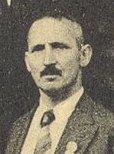Eduard Reichenow

Johann Eduard Reichenow (7 July 1883 – 23 March 1960) was a German protozoologist. He was the son of ornithologist Anton Reichenow.
Biography
[edit]Reichenow was born in Berlin. He studied natural sciences in Heidelberg, Berlin and Munich, and received his doctorate in 1908. After graduation he conducted research of protozoans at the Imperial Health Ministry in Berlin. From 1913 onward, he served as a government zoologist in Kamerun, where he did studies on the biology of the malaria pathogen. From 1916 to 1919 he conducted research at the Museo Nacional de Ciencias Naturales in Madrid, and in 1921 was appointed director of the protozoology department at the Schiffs- und Tropenkrankheiten in Hamburg. During the same year, he received his habilitation from the University of Hamburg and in 1925 obtained the title of professor.[1]
He was an editor of the journals: Zeitschrift für Tropenmedizin, the Zentralblatt für Bakteriologie and the Zeitschrift für Parasitenkunde.[2] The Eduard-Reichenow-Medaille is an award offered by the Deutsche Gesellschaft für Protozoologie.[3]
In 1932 Alfred Kahl named the protozoan genus Reichenowella (family Reichenowellidae) in his honor.[4][5] His name is also associated with a species of Plasmodium, Plasmodium reichenowi, a malaria parasite of chimpanzees and gorillas, which Reichenow was the first to document.[6][7] He died in Wuppertal.
In 1943 Reichenow and Lilly Mudrow helped solve a long-standing mystery in malaria infections; What is the parasite doing after mosquito bite and before blood-stage infection? Together the two researchers discovered parasite growth in endothelial cells in canaries infected the parasite in the avian malaria species Plasmodium praecox (now classified as P. relictum).[8][9][10]
Personal life
[edit]Reichenow married his former student and long-term collaborator Lilly Mudrow on 11 February 1946. Together they had a daughter, born March 1948. Mudrow died suddenly on 5 March 1957, after eleven years of marriage.[11]
Written works
[edit]In 1927–29 he published the fifth edition of Franz Theodor Doflein's Lehrbuch der Protozoenkunde; eine Darstellung der Naturgeschichte der Protozoen.[12] The following are a few of his other noteworthy published works:
- Coccidien-Untersuchungen - Parts 1-3, 1913 (with C. Schellack) – Coccidia investigations.
- Die Tätigkeit deutscher Arzte in Afrika, 1935 – German medical activity in Africa.
- Ostafrikanische Beobachtungen an Trypanosomiden, 1940 – East African observations of Trypanosoma.
- Morphologie und Entwicklungsgeschichte der Protozoen, 1941 – Morphology and developmental history of protozoans.
- Grundriß der Protozoologie für Ärzte und Tierärzte, 1946 – Outline of protozoology for physicians and veterinarians.[13]
References
[edit]- ^ Plett - Schmidseder edited by Walther Killy
- ^ "Statement based on translated text from an equivalent article at the German Wikipedia".
- ^ Ehrungen - Deutsche Gesellschaft für Protozoologie Eduard-Reichenow-Medaille
- ^ Petymol Biographical Etymology of Marine Organism Names. Q & R
- ^ Taxonomicon Taxon: Genus Reichenowella
- ^ The Viral Storm: The Dawn of a New Pandemic Age by Nathan Wolfe
- ^ Plasmodium reichenowi Wellcome Trust Sanger Institute
- ^ Tropenmedizin, Bernhard-Nocht-Institut für (26 October 2015). "Geschichte". www.bnitm.de (in German). Retrieved 5 January 2020.
- ^ Reichenow, Eduard; Mudrow, Lilly (1943). "Der Entwicklungsgang von P. praecox in Vogelkörper". Deutsche Tropenmedizinische Zeitschrift.
- ^ Sá, Magali Romero (June 2011). "Studies of avian malaria and Brazil in the international scientific context (1907-1945)". História, Ciências, Saúde-Manguinhos. 18 (2): 499–518. doi:10.1590/S0104-59702011000200011. ISSN 0104-5970. PMID 21779696.
- ^ Hase, A. (1960). "Professor Dr. phil. Dr. h. c. Eduard Reichenow zum Gedachtnis". Zeitschrift für Parasitenkunde (in German). 20 (2). doi:10.1007/BF00260204. ISSN 0044-3255. S2CID 27093101.
- ^ The Ciliated Protozoa: Characterization, Classification and Guide by John O. Corliss
- ^ Google Search (published works)
